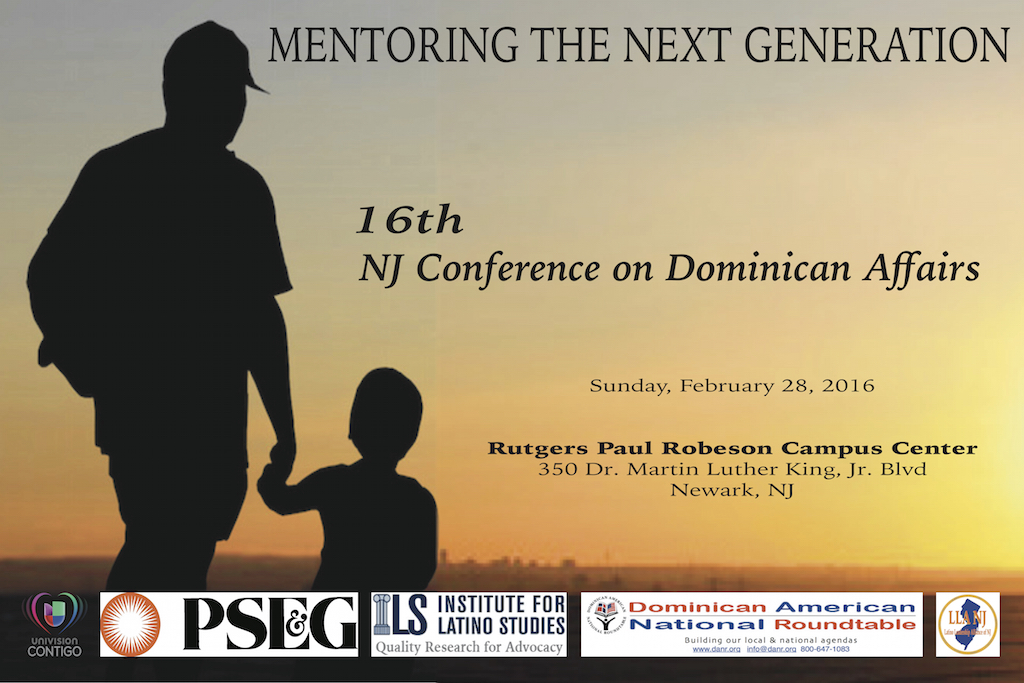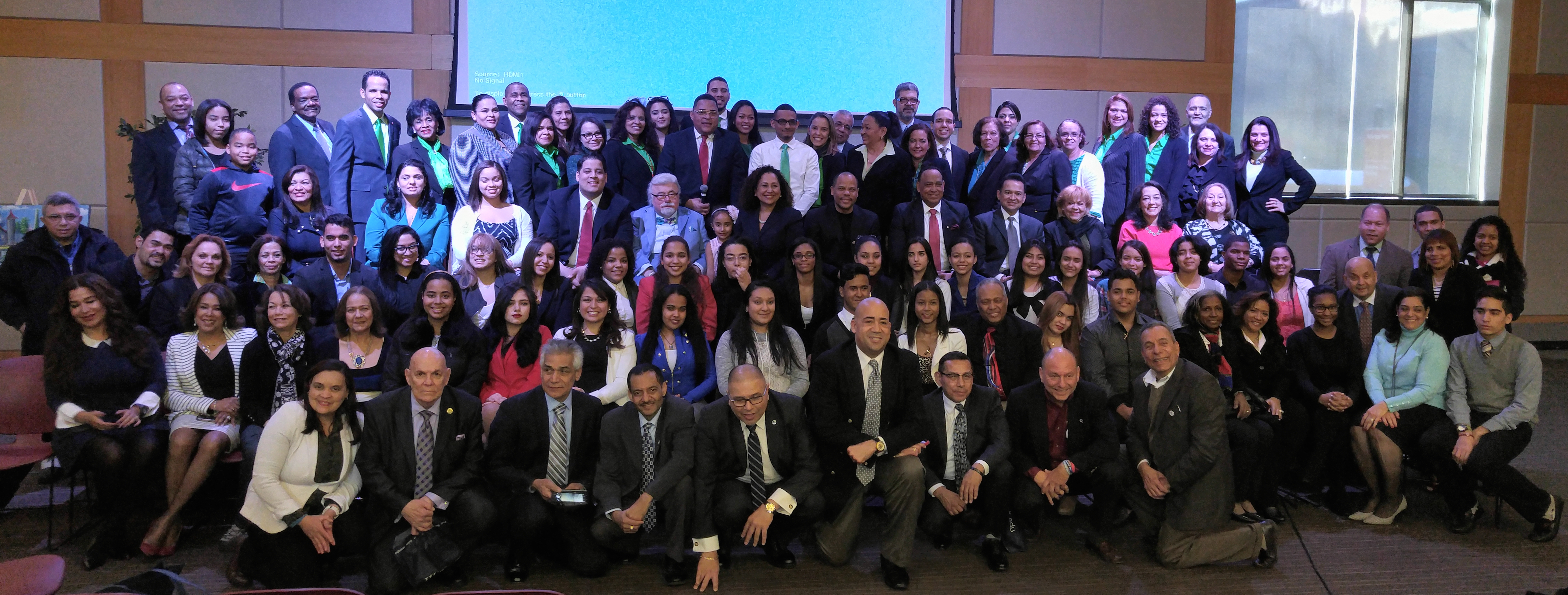
EN ESPANOL

Tristate area. – Along the past sixteen years, The Institute For Latino Studies (ILS) has hosted the Conference on Dominican Affairs (CODA), the only statewide forum of analysis for Dominican and Latino empowerment in the United States.
This year The Institute partnered with UNIVISION, PSE&G, Merengue Restaurant-Newark, Latino Leadership Alliance of New Jersey (LLANJ), Dominican American National Roundtable (DANR), National Dominican American Council, Global Psychiatry Services, PC (GPS), and other organizations, for a successful Conference that took place on Sunday, February 28, 2016, from 8:30AM to 3:00PM, at Rutgers Paul Robeson Campus Center, 350 Dr. Martin Luther King, Jr. Blvd., Newark, NJ.
Following is a report, which includes links to specially produced videos and photo slides distilled from conference proceedings:
The program began with a plenary session featuring Mayor of Perth Amboy Wilda Diaz.
“I would like to thank Maria Teresa Montilla for the opportunity to address you today…I can’t thank her enough for having me here today,” she said to then congratulate hundreds of students from Perth Amboy, Paterson, and from across New Jersey attending the conference. “I would like to say to all the young people here: ‘Yes you can.’ Take advantage of what you are going to learn here at this conference.”
Thanking her husband for his unwavering support, she spoke about challenges she faced to become the first female Latino Mayor in New Jersey. She explained she had to resign from her job as vice president of a financial institution to be able to run for mayor. In addition, Mayor Diaz explained how she had also to confront and defeat an entrenched political machine to win.
.
Her remarks earned her several applauses, including a thunderous one when she shared with the audience that despite many obstacles she was re-elected for another term, and that recently, she has been trusted with a new role serving as the first female Mayor in New Jersey tapped to be President and Chair of the New Jersey Urban Mayors’ Association (NJUMA).
After her remarks, the Conference held its opening plenary session with Professor Alberto Correa from Universidad Interamericana de Puerto Rico (video). He gave a spellbinding lecture entitled “Math Anxiety and How to Overcome Math Phobia.” The Rutgers Paul Robeson Campus Center’s Essex auditorium was packed with hundreds of students, community leaders, businessmen and political figures. The jest of Dr. Correa’s well received and animated powerpoint presentation motivated conference attendees and students to keep cracking laughing and listening to him.
After the plenary, Dr. Correa also presented as a panelist in the workshop entitled “Techniques of Effective Leadership.” Many who attended the opening plenary session, flocked into a classroom to keep listening to him. The room was packed to capacity.
There were five concurrent forums: The Current Crisis in Puerto Rico moderated by Nestor Montilla, Sr. and Josue Bonilla; The Role of Latinos in the Presidential Race 2016, moderated by Antonio Martinez, II, Esq.; Leadership Styles by Dr. Maria Teresa Montilla; Youth Leadership moderated by Augusto Suarez; and a historic Health Professionals Summit coordinated by Dr. Aritmedes Restituyo and Dr. Miguel Hernandez.
Following are highlights of forums’ discussions:
1. In The Current Crisis in Puerto Rico experts provided a description of the situation in Puerto Rico.
Juan Cartagena, President & General Counsel of LatinoJustice PRLDF commented: “If a debt is illegal, it should not be paid. Puerto Rico is paying an excessive amount of debt, $72 billones, in debt services that cap the pension of teachers and police officers. The solution to this problem lays on congress, which could fix this immediately. I appreciate the fact that the Conference on Dominican Affairs (CODA) has dedicated a portion of the agenda to discuss the issue of Puerto Rico, because at the end of the day what affects Puertorriqueños, affects all Latinos.”
New Jersey Senator Teresa Ruiz contributed to the discussion by saying: “I would like to thank CODA for recognizing the importance of this issue affecting Puerto Rico, not in the context of not only Puerto Ricans but in the context of Dominican families living on the island as well, and the economic suffering that they too will undergo if we don’t step up to the plate and come up with the right solution”;
Legislator of San Juan, Puerto Rico, and President of the Dominican American National Roundtable (DANR), Claribel Martinez-Marmolejos, reported on the effect of the crisis on the people living in Puerto Rico, noting: “We must consider who are Puerto Rico’s creditors; I am sure they were aware of Puerto Rico’s inability to pay back the monies they were lending. I live in Puerto Rico, and work in the Senate’s office of Constituents Services, and have witnessed the raise in claims for assistance due to the current crisis.”
In his in-depth analysis of health issues resulting from the crisis, Dennis Gonzalez, from the U.S. Department of Health, reported (see video): “Blood banks cannot use blood donated by Puerto Ricans because there is no way to test if that blood has been contaminated by the Zika virus. Puerto Rico now has been obligated to bring blood from here and that is extremely expensive. Puerto Rico needs about 10 thousand units of blood a month.”
There were several questions from the audience regarding what needs to be done. Some attendees showed their frustration regarding the crisis impacting Puerto Rico by stating out loud they were willing to do whatever it takes to help solve the problem.
2. In forum the Role of Latinos in the Presidential Race 2016, panelists included Fernando Alonso, Chairman of Bergen County Republican Hispanic Association, Julio Marenco, Commissioner of Finance & Revenue, North Bergen, Juan Cartagena, President & General Counsel of LatinoJustice PRLDF, and NYS Assemblyman Guillermo Linares, who offered a panoramic view of the role Latinos could play in this election.
3. In the Leadership Styles, Dr. Maria Teresa Montilla presented an interactive group session of identification of leadership styles, including strengths and weakness. Concepts such as personality, temperament and character, as they relate to the exercise of leadership, were dissected in discussions and group exercises.
4. As indicated, the Youth Leadership workshop featured Dr. Alberto Correa and Dr. Theresa Rodriguez. They outlined various aspects of effective leadership development and exercises. Participants learned fundamentals of leadership. Workshop coordinator Augusto Suarez, a Montclair State University student and vice president of the Dominican American National Roundtable, said: “I first want to congratulate CODA for running a very successful and impactful conference. The three points where I feel we have found the most success are: 1). Content: all of the speakers and moderators helped to create the epitome of what a LATINO leader encompasses. 2). Pride in heritage: we acknowledged where we came from while also creating a space to share that pride with the next-generation. And 3). Food: it is important not just to feed a person when they are hungry, but to give people knowledge which feeds the soul. On both accounts, I know we were successful at that.”
Suarez submitted to CODA’s organizers a report of workshop proceedings stating the following:
For the first 45 minutes, Dr. Correa spoke about the different types of leadership, and for a good portion of the conversation addressed aspects that are within all leaders. He also emphasize the importance of developing leadership skills and that the leader is made not born. Students conversed interactively with Dr. Correa for approximately 20 minutes.
For the next 45 minutes, Dr. Theresa Rodriguez spoke about the doors we open, walk-through, and close, in order to progress through life. Her riveting life-story addresses the importance of forgiveness, while also emphasizing that our experiences in life do not determine where we are going; instead, she stated firmly, our own personal perspective and choices determine our future. Her presentation was then followed by a riveting Q&A session. During the Q&A, the audience took advantage of the time to give their own opinion.
In his report, Suarez concluded indicating that the audience was fully engaged and impacted by the presenters in a positive way; the panelists felt really good about how their presentations turned out; and that three of the students in the audience wish to volunteer at a later date to present in public what they learned out of the panel discussion.
5. And finally, CODA hosted a historic Health Professionals Summit featuring presidents and members of health professional organizations who discussed in details the many ways in which their organizations empower health professionals and offer guidance and support to newly arrived professionals in their intended fields.
Summit speakers listed in the program included the following health professionals:
Dr. Leonardo Paula, Secretary & Past President, Dominican Medical Association NY (DMA), who spoke about DMA History, mission and vision.
Dr. Aritmedes Restituyo, Asociación Hispana de Profesionales de la Salud (AHPSI), who spoke about how AHPSI provides access to health professionals in USA.
George A. Zeppenfeldt, President & CEO Association of Hispanic Healthcare Executives (AHHE) & Roundtable of Hispanic Professional Health Associations; and Adviser to Manhattan Borough President
Dr. Jose Goris, Past President, Dominican Medical Dental Society, and Vice President, Corinthian IPA. He spoke offered an overview about the Dominican Medical Dental Society.
Dr. Fidelina Santiago Álvarez, from Colegio Médico New England, spoke about her organization’s role to afford access to health professionals.
Dr. Tagliony Pacheco, from Colegio Médico Valle Delaware, Philadelphia, was listed to tell the history to integrate Dominican health professionals in Delaware and Philadelphia.
Dr. Marcelino Amezquita, from Colegio Médico Dominicano of Florida, was listed to provide an overview about the process to integrate Dominican health professionals in Florida.
Similarly, Dr. Pedro Ciprian, Presidente, Colegio Médico de Puerto Rico, was included in the program to speak about the role of his organization to integrate Dominicans in the health professions.
Dr. Pedro Nicasio, Secretario de Asuntos Internacionales, Colegio Médico Dominicano in the Dominican Republic, couldn’t attend the conference. He was listed to talk about the history, present and future of Colegio Medico Dominicanos and its international chapters.
After concurrent workshops, the Conference Luncheon Plenary Session featured the annual CODA speech by Dr. Maria Teresa Montilla, President of the Institute for Latino Studies.
The plenary also included an animated and motivational session where representatives of different generations and diverse fields, shared their life story, highlighting their path to success. The list of presenters included New York State Assemblyman Guillermo Linares, Abraham Lopez, Angelica Cruz, Raul Acosta, Dr. Rigoberto Perez, and veteran entrepreneur Antonio (Tony) Ibarria, who regaled the audience with an account of his journey toward success:
“I congratulate all the leaders who have spoken here today. The list of people who have worked for so long on behalf of our community is very long. You, students who have dreams and want to succeed, look at what these leaders have gone through, and where life has brought them. If they did it, so can you. Just keep the hope and remain disciplined. Work, work, and work towards your goals. You can do whatever you set out to do. Yes, you can. This country is a wonderland.”
